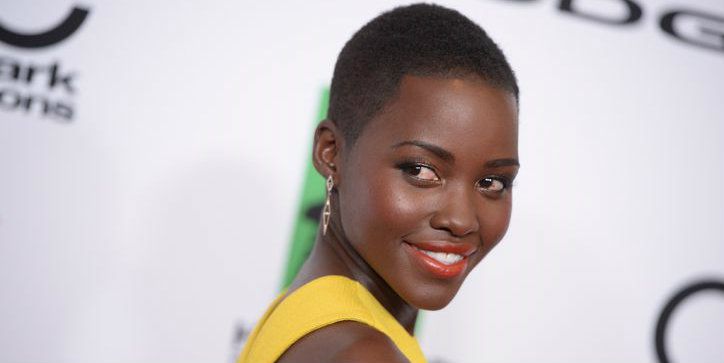Simply Beautiful without Justification: A Dark-Skinned Woman’s Reflection on the 'Lupita Effect'

by Rev. Dominique C. Atchison
Like many people of African descent, the issue of skin color is a theme in my family narrative. My mother’s mother was the dark-skinned one of 2 sisters. If you go a gathering my mother’s side of the family you may hear references being made to someone simply named “Black.” “Black” was the nickname given to my mother’s father who was apparently the one with the darkest skin in his family. And apparently my father was derisively referred to as “Smokey” because he was the only dark-skinned person in a family full of light-skinned people. The theme of being the only dark-skinned one in one’s family is a theme that repeats itself in my ancestry.
As I move further into adulthood I have begun to see the damage we do to each other as black women by holding on to the socio-cultural legacy of skin color gradation. I see how even our well intentioned celebrations can unfortunately be subject this legacy.
This leads me to Lupita Nyong’o. First of all I want to say, Lupita Nyong’o is beautiful and talented (lest we forget). And this article is by no means an attempt to take away from her joy and all of the well-deserved attention she has been receiving.
At the same time I must say there was something that really bothered me about way we chose to name Lupita’s beauty. I wondered if we as Black women were talking too much about Lupita’s beauty. I wondered if we were talking too little about her talent. And if my wonderings were true, I wondered why?
It was almost as if we as back women had to prove to society and ourselves that is was ok to see a dark-skinned woman as beautiful. Every status update, every Tweet, every blog and every article felt like a summation in a case where dark-skinned femaleness was on trial.
At my father’s funeral, one of my father’s cousin said to me, “your mother is the most beautiful dark-skinned woman I’ve ever met.” That was supposed to be a compliment. And I guess it could have been. But there was something problematic about the addition of the word “dark-skinned” after the word “beautiful”. Her words suggested that my mother and all dark skinned Black women were so unattractive that their beauty had to be judged by a separate standard. My mother couldn’t simply be beautiful without that distinction.
I share this story because I believe that what was behind my cousin’s comment is very much connected to the way black women have reacted to Lupita Nyong’o. I haven’t heard anyone specifically say that Lupita is beautiful for a dark skinned woman. Although I’m sure someone with the black community has drawn that sort of distinction. But I think some of the black female preoccupation with Lupita’s beauty is an attempt to protect her from that sort of distinction. It’s an attempt to prove that she isn’t just “pretty for a dark-skinned girl” but she that she is simply beautiful.
I don’t think this is a completely bad thing. At the same time, when do we as black women get to be beautiful just because we are? When do we unpack the really disturbing history behind skin color prejudice? When do we realize that the historical and cultural standards on which we base our worth never had anything to do with us? When does it stop being news worthy that a dark-skinned black woman is beautiful?
As black women we do a lot of footwork attempting to avoid being associated with these stereotypes and negative archetypes that have haunted us for generations. But what we have to realize is these racialized gradations (skin color, hair texture, body type…) were never actually about us. They affect us but they don’t belong to us. They are born out of a need to justify our past enslavement and present oppression. And when we treat these stereotypes and gradations as if they were facts and not symptoms or artifacts, we end up unintentionally affirming that oppression.
So my fantastical hope is that Lupita Nyong’o will one day star as the love interest in a romantic comedy. And I dream that when she does star in that rom com, we as black women can simply enjoy it without needing to justify or prove or worry about whether she is seen as “Jezebel” or “Mammy” if she gains weight. And my sincere prayer for Black women is that we can find ways to simply be beautiful without it justification.
The Rev. Dominique Chantell Atchison is a native of the Bronx. She holds a Bachelor of Arts in African American Studies from Oberlin College in Ohio and a Master of Divinity from Union Theological Seminary in New York. Rev. Atchison was ordained to Christian ministry by the United Church of Christ. She currently serves as an Associate Minister, Chaplain and Sacred Conversations on Race Coordinator. Rev. Atchison is also a singer, performance artist and a writer. She has contributed articles to several blogs, including the Young Clergy Women’s Project’s “Single Rev’s Guide to Life” and For Harriet.

No comments: